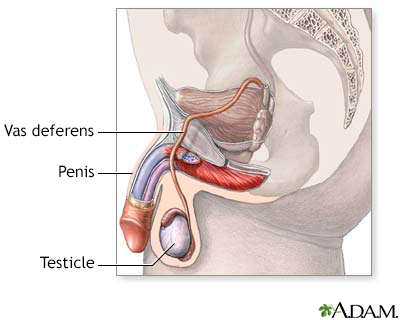Partial androgen insensitivity syndrome
Definition
Partial androgen insensitivity syndrome (PAIS) is a genetic (inherited) condition that occurs when the body can't respond to male sex hormones (androgens). Testosterone is a male sex hormone.
PAIS is a type of androgen insensitivity syndrome. Androgen insensitivity syndrome is one of the conditions that are described as intersex or difference of sex development (DSD).
Alternative Names
PAIS; Androgen insensitivity syndrome - partial; Incomplete testicular feminization; Type I familial incomplete male pseudohermaphroditism; Lubs syndrome; Reifenstein syndrome; Rosewater syndrome; Intersex; Difference of sex development; DSD
Causes
In the first 2 to 3 months of pregnancy, all babies have the same genitals. As a baby grows inside the womb, male or female genitals develop depending on the pair of sex chromosomes the baby has from the parents (XY for male, XX for female). It also depends on the levels of androgens. In a baby with XY chromosomes, high levels of androgens are made in the testes. This baby will develop male genitals. In a baby with XX chromosomes, there are no testes and the levels of androgens are very low. This baby will develop female genitals.
In PAIS, there is a change in the gene on the X chromosome that helps the body recognize and use male hormones properly. This leads to problems with the development of the male sex organs. At birth, the baby may have ambiguous external genitals. This means that they do not look typically either male or female.
The syndrome is passed down genetically (X-linked recessive inheritance). People with two X chromosomes are not affected if only one copy of the X chromosome carries the genetic mutation. Males who inherit the gene from their mothers will have the condition. There is a 50% chance that a male child of a mother with the gene will be affected. Every female child of a mother with the gene has a 50% chance of carrying the gene. Family history is important in determining risk factors of PAIS.
Symptoms
People with PAIS may have both male and female physical characteristics. These may include:
- The urethra being on the underside of the penis, small penis, small scrotum (with a line down the middle or incompletely closed), or undescended testicles.
- Breast development in males at the time of puberty.
- Decreased body and facial hair, but normal pubic and armpit hair.
- Sexual dysfunction and infertility.
Exams and Tests
The health care provider will perform a physical exam.
Tests may include:
- Blood tests to check levels of male and female hormones
- Genetic tests such as karyotyping to check chromosomes
- Sperm count
- Testicular biopsy
- Pelvic ultrasound to check if female reproductive organs are present
Treatment
Infants with PAIS may be assigned a gender depending on the extent of genital ambiguity. However, gender assignment is a complex issue, and the need for it and the timing of it must be considered carefully. PAIS can be distressing for parents and families. While early surgery may make the parents feel more comfortable, the child may not be happy with the decision as they become older. Many health experts and intersex advocates suggest waiting until the child is old enough to be involved in the decision, unless surgery is needed for the health of the infant. Treatment guidelines are still evolving.
Possible treatments for PAIS include:
- Surgery may be done to reduce breasts, repair undescended testicles, or reshape the penis to provide a more male appearance. They may also receive androgens to help facial hair grow and deepen the voice.
- Surgery may be done to remove the testicles and reshape the genitals to provide a more female appearance. The female hormone estrogen is then given during puberty.
It is vital that children with PAIS and their parents receive care and support from a health care team that includes different specialists with expertise in gender medicine.
Support Groups
The following groups can provide more information on PAIS:
- Interact Advocates for Intersex Youth-- interactadvocates.org/
- NIH Genetic and Rare Diseases Information Center -- rarediseases.info.nih.gov/diseases/5692/partial-androgen-insensitivity-syndrome
Outlook (Prognosis)
Androgens are most important during early development in the womb. People with PAIS can have a normal lifespan and be totally healthy, but they may have difficulty conceiving a child.
When to Contact a Medical Professional
Contact your provider if you, your son, or a male family member has infertility or incomplete development of male genitals. Genetic testing and counseling are recommended if PAIS is suspected.
Prevention
Prenatal testing is available. People with a family history of PAIS should consider genetic counseling.
Gallery

References
Chan Y-M, Hannema SE, Achermann JC, Hughes IA. Disorders of sex development. In: Melmed S, Auchus, RJ, Goldfine AB, Koenig RJ, Rosen CJ, eds. Williams Textbook of Endocrinology. 14th ed. Philadelphia, PA: Elsevier; 2020:chap 24.
Délot EC, Vilain E. Disorders of sex development. In: Strauss JF, Barbieri RL, eds. Yen & Jaffe's Reproductive Endocrinology. 8th ed. Elsevier; 2019:chap 16.
Shnorhavorian M, Fechner PY. Disorders of sexual differentiation. In: Gleason CA, Juul SE, eds. Avery's Diseases of the Newborn. 10th ed. Philadelphia, PA: Elsevier; 2018:chap 97.